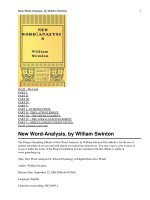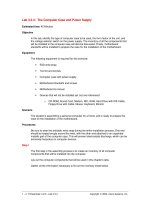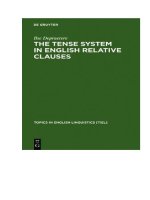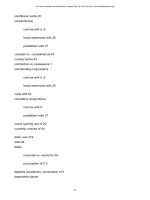Tài liệu The Infant System, by Samuel Wilderspin pptx
Bạn đang xem bản rút gọn của tài liệu. Xem và tải ngay bản đầy đủ của tài liệu tại đây (775.47 KB, 198 trang )
CHAPTER I.
CHAPTER II.
CHAPTER III.
CHAPTER IV.
CHAPTER V.
CHAPTER VI.
CHAPTER VII.
CHAPTER VIII.
CHAPTER IX.
CHAPTER X.
CHAPTER XI.
CHAPTER XXI.
CHAPTER XIII.
CHAPTER XIV.
CHAPTER XV.
CHAPTER XVI.
CHAPTER XVII.
CHAPTER XVIII.
CHAPTER XIX.
CHAPTER XX.
CHAPTER XXI.
CHAPTER XXII.
CHAPTER I.
CHAPTER II.
CHAPTER III.
CHAPTER IV.
CHAPTER V.
CHAPTER VI.
CHAPTER VII.
CHAPTER VIII.
1
CHAPTER IX.
CHAPTER X.
CHAPTER XI.
CHAPTER XII.
CHAPTER XIII.
CHAPTER XIV.
CHAPTER XV.
CHAPTER XVI.
CHAPTER XVII
CHAPTER VIII.
CHAPTER XIX.
CHAPTER XX.
CHAPTER XXI.
CHAPTER XXII.
The Infant System, by Samuel Wilderspin
The Project Gutenberg EBook of The Infant System, by Samuel Wilderspin This eBook is for the use of
anyone anywhere at no cost and with almost no restrictions whatsoever. You may copy it, give it away or
re-use it under the terms of the Project Gutenberg License included with this eBook or online at
www.gutenberg.net
Title: The Infant System For Developing the Intellectual and Moral Powers of all Children, from One to
Seven years of Age
Author: Samuel Wilderspin
Release Date: February 8, 2004 [EBook #10985]
Language: English
Character set encoding: ISO-8859-1
*** START OF THIS PROJECT GUTENBERG EBOOK THE INFANT SYSTEM ***
Produced by Stan Goodman, Josephine Paolucci and the Online Distributed Proofreading Team.
[Illustration]
THE INFANT SYSTEM,
FOR
DEVELOPING THE INTELLECTUAL AND MORAL POWERS OF ALL CHILDREN,
FROM ONE TO SEVEN YEARS OF AGE
BY SAMUEL WILDERSPIN, INVENTOR OF THE SYSTEM OF INFANT TRAINING.
"Whoso shall receive one such little child in my name, receiveth me." Matt. xviii. 5.
The Infant System, by Samuel Wilderspin 2
"Take heed that ye despise not one of these little ones." Matt. xvii. 10.
EIGHTH EDITION, CAREFULLY REVISED.
1852.
PREFACE
In again presenting this volume to the world, I trust I feel thankful to God for the favour with which the Infant
System has been received, and for all the aid I have enjoyed in my course of labour. Had the measures I
originated for the development of the infant mind, and the improvement of the moral character, been
sanctioned at first, as many now think they should have been, their progress would, undoubtedly, have been
far greater; but when I consider what has been accomplished under the divine benediction, and amid greater
difficulties than ever beset the path of an individual similarly occupied, I know not how to express the
gratitude of which I am conscious. It seems proper and even necessary to remark, that the system explained in
this volume, is the result of many years of labour. Thousands of children have been attentively observed, and
for the necessities that arose in their instruction, provision has been made. Others have doubtless reached
some of the conclusions at which I have arrived, but this is only another instance of the coincidence in
judgment and effort, often discoverable in persons far apart, whose attention has been directed to similiar
subjects; but with the exception of the elliptical plan, devised by Dr. Gilchrist, I am not aware that I owe an
idea or contrivance to any individual whatever. Upwards of twenty-five thousand children have been now
under my own care, in various parts of the United Kingdom, whose age has not exceeded six years; myself,
my daughters, and my agents, have organized many score of schools, and thus I have had opportunities of
studying the infant mind and heart, such as none of my contemporaries have ever possessed.
Still I am aware I have much to learn. I am far less satisfied with the extent of my knowledge, and far less
confident of its perfection and completeness now than I was in the earlier part of my course. The whole
energies of my mind, however, having been thrown upon the subject, and the whole of my time for the third
of a century having been zealously devoted to it, I trust the volume will contain knowledge of a more plain,
simple, and practical character than is elsewhere to be found: perhaps it may not be presumption to say than
can elsewhere be found. Should I have the pleasure to labour for years to come, I trust I shall have much more
to communicate on the subject.
Two editions of this work in its former state have been printed in German; and it has also been reprinted in
America. I have, however, felt it due to the friends of education, to make this volume as complete as possible,
and though still occasionally engaged in superintending and organizing schools, I have felt it necessary to
revise this eighth edition very carefully throughout, and commence it with a new and additional chapter.
Moor Cottage, Westgate Common, Wakefield, Nov. 1552.
A FEW TESTIMONIALS TO THE INFANT SYSTEM.
It is said that we are aiming at carrying education too far; that we are drawing it out to an extravagant length,
and that, not satisfied with dispensing education to children also have attained what in former times was
thought a proper age, we are now anxious to educate mere infants, incapable of receiving benefit from such
instruction. This objection may be answered in two ways. In the first place, it should be observed, that the
objection comes from those very persons who object to education being given to children when they arrive at
a more advanced period, on the ground that their parents then begin to find them useful in labour, and
consequently cannot spare so much of their time as might be requisite: surely, that, the education of the
children should commence at that time when their labour can be of value to their parents. But the other
answer, in my opinion, is still more decisive: it is found even at the early age of seven or eight, that children
are not void of those propensities, which are the forerunners of vice, and I can give no better illustration of
The Infant System, by Samuel Wilderspin 3
this, than the fact of a child only eight years old, being convicted of a capital offence at our tribunals of
justice; when, therefore, I find that at this early period of life, these habits of vice are formed, it seems to me
that we ought to begin still earlier to store their minds with such tastes, and to instruct them in such a manner
as to exclude the admission of those practises that lead to such early crime and depravity. A Noble friend has
most justly stated, that it is not with the experiences of yesterday that we come armed to the contest: it is not a
speculation that we are bringing forward to your notice, but an experiment.' The Lord Chancellor.
"In leaving poor children to the care of their parents, neglect is the least that happens; it too frequently occurs
that they are turned over to delegates, where they meet with the worst treatment; so that we do not in fact
come so much into contact with the parents themselves as with those delegates, who are so utterly unfit for the
office they undertake. Infant Schools, however, have completely succeeded, not only in the negative plan they
had in view, of keeping the children out of vice and mischief, but even to the extent of engrafting in their
minds at an early age those principles of virtue, which capacitated them for receiving a further stage of
instruction at a more advanced school, and finally, as they approached manhood, to be ripened into the noblest
sentiments of probity and integrity." The Marquis of Lansdowne.
"I am a zealous friend, upon conviction, to Infant Schools for the children of the poor. No person who has not
himself watched them, can form an adequate action of what these institutions, when judiciously conducted,
may effect in forming the tempers and habits of young children; in giving them, not so much actual
knowledge, as that which at their age is more important, the habit and faculty of acquiring it; and it correcting
those moral defects which neglect or injudicious treatment would soon confirm and render incurable. The
early age at which children are taken out of our National Schools, is an additional reason for commencing a
regular and systematic discipline of their minds and wills, as soon as they are capable of profiting by it; and
that is at the very earliest opening of the understanding, and at the first manifestation of a corrupt nature in the
shape of a childish petulance and waywardness." The Bishop of London.
"The claims of this Institution were of such a nature, that they required no recommendation but a full
statement of them. The foundation of its happy results had been pointed out to exist in the principles of policy,
and of religion paramount to all policy a religion that appealed to every feeling of human nature. He would
recommend this charity, as one less attended with perplexity in its operations or doubt as to its utility, than
many, which, though established with the best possible motives, frequently failed in effecting the good
proposed; but in this the most acute opponent could not discover any mischief that would arise from its
success." Sir James Mackintosh.
"I have always thought that that man that would be the greatest benefactor to his country who did most for the
suppression of crime; this I am sorry to say, our legislature have neglected in a great degree, while they have
readily employed themselves in providing for its punishment. Those acquainted with our prisons must know
that those found to have sunk deepest into vice and crime were persons who had never received any
education, moral or religious. In the Refuge for the Destitute, an exact account was kept, and it was found that
of the great mass of culprits sent there by the magistrates on account of their youth, two-thirds were the
children of parents who had no opportunity of educating them. By this institution they would at once promote
virtue and prevent vice." Dr. Lushington.
"The real fact is, that the character of all mankind is formed very early much earlier than might be supposed:
at the age of two or three years, dispositions were found in children of a description the most objectionable. In
these schools the principles of mutual kindness and assistance were carried as far as could well be conceived,
and it was most delightful to regard the conduct of the children towards each other. Instead of opposition, they
displayed mutual good-will, inculcated to the greatest degree, so as to destroy in the minds of the children that
selfishness which was the bane of our nature. Such effects appeared almost to realize the golden age, for the
children appeared always happy, and never so happy as when attending the schools." W. Smith, Esq. M.P.
"I feel, having witnessed the happy effects produced by these schools, a warm zeal in support of such
The Infant System, by Samuel Wilderspin 4
institutions. We cannot begin too soon to impress religions principles on the minds of the young; it is an
affecting consideration, that while great statesmen have been busied in their closets on some fine scheme or
speculation, they have neglected these salutary principles which the Almighty has given to mankind. It is
remarkable how eagerly the young mind receives the histories of the Bible, and how well they are fitted to
work on their dispositions; and when I consider the miserable state of the poor, I cannot but feel that the rich
are in some degree, the authors of it, in having neglected to afford them the means of education." W.
Wilberforce, Esq.
"I am much delighted with what I have seen and heard. I confess I entertained doubts of the practicability of
the Infant School System, but these doubts have this day been removed. If in one month so much can be done,
what might not be expected from further training? I now doubt no longer, and anticipate from the extension of
such schools a vast improvement in the morals and religion of the humble classes. I conclude with moving a
vote of thanks to Mr. Wilderspin." Lord Chief Justice Clerk.
"Sir John Sinclair, rose, and in addressing Mr. Wilderspin, said, that he was astonished with the results of five
weeks training in these perfect infants. He had never seen a greater prodigy. He too had had his
prejudices his doubts of the possibility of infant education; but these doubts had now vanished, and for ever.
The arrangements for bodily exercise, connected with mental and moral improvement, especially delighted
him. He was amused as well as instructed by the well-applied admixture of diverting expedients to keep the
children alive and alert. It was 'seria mixta jocis,' but there was practical sense in the seemingly most frivolous
part of the plan. He trusted that the time was not far distant when there should be many such institutions. He
called on all present to join him in returning cordial thanks to Mr. Wilderspin." Scotsman.
"The grand secret of the improvement found to be derived from these establishments, is their constant
tendency to remove evil example and misery from the little creatures during almost the whole of their waking
hours. Consider how a child belonging to one of these passes his day. As soon as he is up, the indispensable
condition, and the only one of his admission to the school, that of clean face and hands, is enforced, and the
mother, in order to be relieved of the care of him during the, day, is obliged to have him washed. He then
leaves the abode of filth and intemperance, and squalid poverty, and ill-temper, for a clean, airy place,
pleasant in summer, warm and dry in winter; and where he sees not a face that is not lighted up with the smile
of kindness towards him. His whole day is passed in amusing exercises, or interesting instruction; and he
returns at evening-tide fatigued and ready for his bed, so that the scenes passing at his comfortless home make
a slight impression on his mind or on his spirits." Edinburgh Review.
CONTENTS.
The Infant System, by Samuel Wilderspin 5
CHAPTER I.
RETROSPECT OF MY CAREER.
Days and scenes of childhood Parental care Power of early impressions School
experience Commencements in business Sunday school teaching and its results Experiment on a large
scale Development of means and invention of implements Heavy bereavement Propagation of the system of
education in the neighbourhood of London, and ultimately in most of the principal places in England, Wales,
Ireland, and Scotland Misapprehension and perversion of the principles of infant education Signs of
advancement Hope for the future
CHAPTER I. 6
CHAPTER II.
JUVENILE DELINQUENCY.
Teachers of theft Children the dupes of the profligate An effort at detection Afflicting cases of early
depravity Progress of a young delinquent Children employed in theft by their parents Ingenuity of juvenile
thieves Results of an early tuition in crime The juvenile thief incorrigible Facility of disposing of stolen
property A hardened child Parents robbed by their children A youthful suicide A youthful murderer
CHAPTER II. 7
CHAPTER III.
CAUSES OF EARLY CRIME.
Degraded condition of parents Dreadful effects of drunkenness Neglect of children inevitable and
wilful The tutorship of wicked companions Tricks of pantomines injurious Mischiefs arising from sending
children to pawnbrokers Fairs demoralizing All kinds of begging to be repressed
CHAPTER III. 8
CHAPTER IV.
REMEDY FOR EXISTING EVILS.
Means long in operation important Prisons awfully corrupting Deplorable condition of those released from
jail Education of the infant poor Its beneficial results Cases of inviolable honesty Appeal of Mr. Serjeant
Bosanquet The infant school an asylum from accident and a prevention of various evils Obstacles in the
way of married persons obtaining employment Arguments for the plan of infant training Prevalence of
profane swearing The example often shewn by parents Anecdote in illustration Parents ill used by their
young children Christian-like wish of George III Education for poor children still objected to Folly of
such objection illustrated Lectures on the subject of infant training
CHAPTER IV. 9
CHAPTER V.
PRINCIPLES OF INFANT EDUCATION.
Moral treatment Importance of exercise Play-ground indispensable The education of nature and human
education should be joined Mental development Children should think for themselves Intellectual food
adapted for children A spirit of enquiry should be excited Gradual development of the young mind Neglect
of moral treatment Inefficacy of maxims learned by rote Influence of love The play-ground a field of
observation Respect of private property inculcated Force of conscience on the alert Anecdote Advantages
of a strict regard for truth The simple truths of the Bible fit for children
CHAPTER V. 10
CHAPTER VI.
REQUISITES FOR AN INFANT SCHOOL.
The master and mistress should reside on the premises Interior arrangements A school and its
furniture Lesson-posts and lessons The younger children should not be separated from the
older Play-ground arrangements Rotary swing Its management and advantages
CHAPTER VI. 11
CHAPTER VII.
QUALIFICATIONS FOR TEACHERS.
Teachers should practice what they teach Necessity of patience Mere automatons will not do for infant
teachers Disadvantage of using excessive restraint A master and mistress more efficient than two
mistresses Objections to the sole government of females Too frequent use of the divine names should be
avoided General observations
CHAPTER VII. 12
CHAPTER VIII.
HINTS FOR CONDUCTING AN INFANT SCHOOL.
Classification Getting the children into order Language Lessons on objects Rules to be observed by
parents Daily routine of instruction Opening prayer and hymn Object or developing lessons Synopsis of a
week's instruction Cleanliness Never frighten children Guard against forgetfulness Observe
punctuality Be strictly accurate in your expressions Guard against the entrance of disease Maxims for
teachers Resolutions
CHAPTER VIII. 13
CHAPTER IX.
GALLERY TEACHING MORAL AND RELIGIOUS INSTRUCTION.
Original intention of the gallery What lessons are adapted for it Its misapplication Selection of
teachers Observations Gallery lessons on a feather a spider a piece of bog turf a piece of
coal Observations on the preceding lessons Scripture lessons in the gallery The finding of Moses Christ
with the doctors Moral training Its neglect in most schools Should be commenced in infancy Beneficial
effects of real moral culture Ignorance of teachers The gallery most useful in moral training Specimen of a
moral lesson Illustrations of moral culture Anecdotes Simpson on moral education Observations Hints to
teachers
CHAPTER IX. 14
CHAPTER X.
REWARDS AND PUNISHMENTS.
Necessity of some punishment Rewards to monitors Trial by jury Illustrative case Necessity of
firmness Anecdotes Playing the truant Its evils Means for prevention Devices for punishment Sympathy
encouraged Evil of expelling children Case of Hartley Difficulty of legislating for rewards and
punishments Badges of distinction not necessary
CHAPTER X. 15
CHAPTER XI.
LANGUAGE.
Means for conveying instruction Method of teaching the alphabet in connection with
objects Spelling Reading Developing lessons Reading lessons in natural history The arithmeticon Brass
letters Their uses
CHAPTER XI. 16
CHAPTER XXI.
ARITHMETIC.
The arithmeticon How applied Numeration Addition Subtraction
Multiplication Division Fractions Arithmetical tables Arithmetical songs Observations
CHAPTER XXI. 17
CHAPTER XIII.
FORM, POSITION, AND SIZE.
Method of instruction Geometrical song Anecdotes Size Long measure Observations
CHAPTER XIII. 18
CHAPTER XIV.
GEOGRAPHY.
Its attraction for children Sacred geography Geographical song Lessons on geography
CHAPTER XIV. 19
CHAPTER XV.
PICTURES AND CONVERSATIONS.
Pictures Religious instruction Specimens of picture lessons on Scripture and natural history Other means
of religious instruction Effects of religious instruction Observations
CHAPTER XV. 20
CHAPTER XVI.
ON TEACHING BY OBJECTS.
Object boards Utility of this method
CHAPTER XVI. 21
CHAPTER XVII.
PHYSICAL EDUCATION.
Exercise Various positions Exercise blended with instruction Arithmetical and geometrical amusements
CHAPTER XVII. 22
CHAPTER XVIII.
MUSIC.
Infant ditties Songs on natural history Moral lessons in verse Influence of music in softening the
feelings Illustrative anecdote
CHAPTER XVIII. 23
CHAPTER XIX.
GRAMMAR.
Method of instruction Grammatical rhymes
CHAPTER XIX. 24
CHAPTER XX.
THE ELLIPTICAL PLAN.
Method Explained Its success
CHAPTER XX. 25









